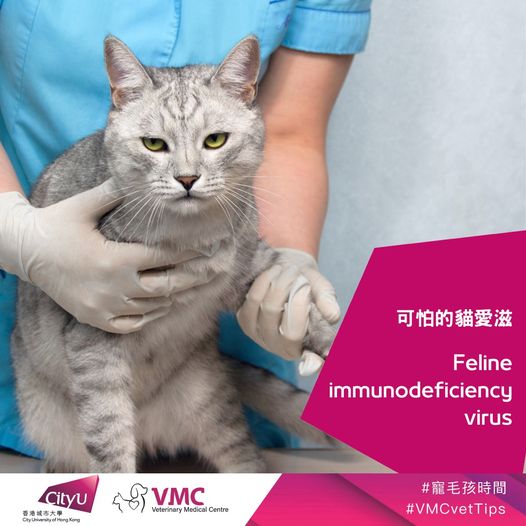【VMC Vet Tip | Feline immunodeficiency virus (FIV)】
Sep 22, 2022

What is Feline immunodeficiency virus (FIV)? It is one of the most common and consequential infectious diseases of cats around the world. It is a virus specific to the cat family. It is similar to HIV (human immunodeficiency virus, the cause of AIDS in people) in that it attacks and weakens the immune system and there is no cure. In infected cats, FIV attacks the immune system, leaving the cat vulnerable to many other infections. Although cats infected with FIV may appear normal for years, they eventually suffer from immune deficiency, which allows normally harmless bacteria, viruses, protozoa, and fungi found in the everyday environment to potentially cause severe illnesses. Though there is no cure for FIV, recent studies suggest that cats with FIV commonly live average life spans, as long as they are not also infected with feline leukemia virus.
FIV was first recognized in the mid-1980s and has been found in cats worldwide. Although widespread, it is not a common infection in cats. Only 1-5% of cats show evidence of exposure to the virus. There are different strains of FIV, and some seem more harmful than others.
What type of disease does FIV cause?
FIV causes disease because it reduces the ability of the cat's immune system to respond to other infections. Infections that the cat would normally be able to recover from become prolonged or chronic. This means that many of the clinical signs associated with FIV are due to other non-healing infections.
It is a good idea to take your cat in for a vet exam if they start showing any of the following FIV symptoms:
- Lethargy
- Lymph node enlargement
- Salivation
- Poor coat condition
- Fever that keeps coming back
- Lack of appetite
- Inflammation in the mouth and gums
- Chronic or recurrent infections in the eyes, skin, upper respiratory tract, or bladder
- Constant diarrhea
- Persistent eye problems
- Behavioral changes
- Signs of neurological disorders
Symptoms of FIV in cats can also include slow and steady weight loss. Many felines infected with the illness end up developing some form of cancer or blood disease.
Appointment/Enquiry:
3650 3000 (Mon-Sun: 9:00am – 7:00pm)
Address:
G-2/F, Trinity Towers, 339 Lai Chi Kok Road, Sham Shui Po
Online booking for revisit with primary care veterinarians or vaccination:
https://www.cityuvmc.com.hk/en/online-booking